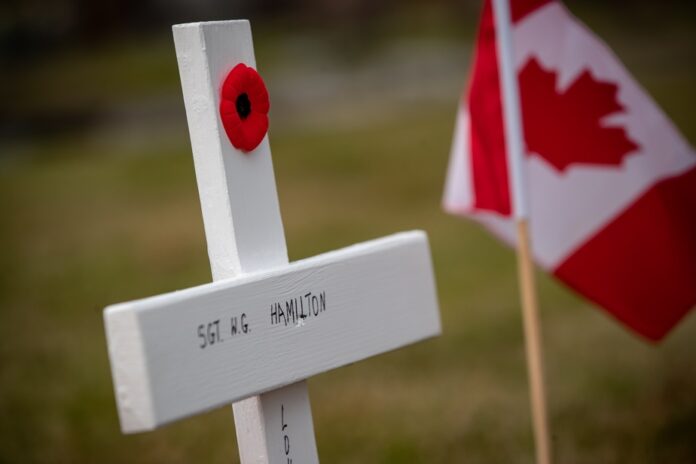(OTTAWA) An internal report from Veterans Affairs Canada is sounding the alarm about the state of military graves and cemeteries across the country, warning that more permanent funding is needed to keep them from falling into disrepair.
The report is the result of an internal audit following a similar review conducted six years ago. At that time, nearly 45,000 of the approximately 207,000 Canadian veterans’ graves were in poor condition due to a lack of resources.
The Trudeau government subsequently invested nearly $25 million over five years in bridge funding beginning in 2018, which the new report says largely solved the problem by facilitating thousands of repairs.
Yet the auditors found that without a sustained increase in funding, this success will be short-lived.
“While the five-year funding […] has enabled the grave marker maintenance team to significantly reduce the number of pending repairs, it will be difficult to maintain an adequate inspection cycle after the project,” reads- we in the report.
“The assessment reveals that the current amount of $1.25 million that has been allocated to the Cemetery and Grave Marker Maintenance Program is insufficient to avoid another maintenance backlog. »
The audit report goes on to note that the annual budget of 1.25 million has remained largely unchanged since 2009, even though the number of graves monitored and maintained by the ministry has increased by more than 40% over the past decade.
Veterans Affairs spokesman Marc Lescoutre confirmed in an email to La Presse Canadienne that the department has not increased base funding for the maintenance program, although it has taken $900,000 from other envelopes to ensure sufficient funds.
“The ministry is exploring opportunities to seek sustainable funding to address the rising cost of maintaining headstone inventory and to develop and implement an appropriate graveyard inspection/maintenance cycle,” said he added.
Bruce Julian, Dominion President of the Royal Canadian Legion, welcomed the progress made in reducing the number of headstones that need maintenance.
“At the same time, we were concerned to read [in the report] that the future of the ministry’s program was at risk due to apparently insufficient funding,” Julian wrote on Monday.
“We call on the federal government to commit to full and ongoing support for the continued maintenance of the headstones placed by the Department of Veterans Affairs. They are essential means of reflection and commemoration dedicated to those who have served our country. »
The Liberals have been repeatedly criticized for refusing to make permanent investments in Veterans Affairs operations in recent years, instead relying on temporary funds and staff to address nagging issues.
They hired hundreds of temporary staff to deal with a backlog of disability claims from ill and injured veterans, as well as dozens of temporary case managers to help permanent staff cope with their overwhelming workloads. .
The temporary measures have been criticized by veterans, service providers and other observers, such as Auditor General Karen Hogan, who has blasted the continued use of what she calls “ad hoc funding.”
During their review of the maintenance of the grave markers, the auditors interviewed employees of Veterans Affairs as well as the Commonwealth War Graves Commission, which cares for the graves of 110,000 Canadian soldiers killed and buried in overseas during the First and Second World Wars.
Their conclusion: “The return to financial status quo after the grave marker maintenance backlog project will result in a situation where grave markers cannot be inspected and maintained during the current 12-year cycle.”
“Furthermore, the 12-year inspection cycle itself was adopted in response to funding levels, not as a best practice. The Commonwealth War Graves Commission currently inspects the grave markers for which it is responsible every six years. »
In addition to Canadian war graves, the commission also cares for those of British, Australian, New Zealand and Indian soldiers killed in the two world wars.
Auditors found problems in the operation of two cemeteries owned and operated by Veterans Affairs Canada: Fort Massey Cemetery in Halifax and God’s Acre Cemetery in Esquimalt, British Columbia, which was recently expanded to accommodate more graves.
“The upgraded facilities were meant to allow on-site staff to be hired to facilitate the increased number of burials at God’s Acre Cemetery.” “However, structural health and safety concerns have limited on-site activities. »
Concerns have also been raised about the lack of formal policies regarding who can actually be buried at God’s Acre, how plots are obtained, reserved and priced, while “there is no operational process in place for processing payments from funeral expenses and storage of cemetery information”.
God’s Acre and Fort Massey also lacked up-to-date operational plans or plans to protect the cultural and historical integrity of either site.


















